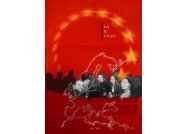turkish-greek civic dialogue - AEGEE Europe
turkish-greek civic dialogue - AEGEE Europe
turkish-greek civic dialogue - AEGEE Europe
Create successful ePaper yourself
Turn your PDF publications into a flip-book with our unique Google optimized e-Paper software.
152<br />
So, Crete file has taken its place on the pages of history and we remember<br />
these days with sadness.<br />
With the protocol on compulsory exchange of Turkish and Greek people signed<br />
on 30 January 1923, the exchanged population from Crete Island, Yanya,<br />
Thessaloniki, Serez, Kavala came to Moudania (Mudanya). Two thousand Muslim<br />
Turkish populations who had different occupations in those days.<br />
They set up a band with the help of their own musical instruments that they<br />
had brought from Crete island and the other musical instruments inherited<br />
from Greeks. This band is now called ‘’Moudania Band’’. Moudania Band was<br />
set up in those complicated days and it is the oldest band of Turkey.<br />
Watchman Kazım Bozdağ (Hüseyin Akbaş’s father-in-law) came to Turkey from<br />
Greece during the population exchange in 1924. While he was coming to Turkey<br />
by Kırzade boat he brought uniform, gaiter, shorts, trainers, goal nets and<br />
other sports equipments that were red and green.<br />
We are still protecting them. We can see all of these sports equipments’ colours<br />
as red and green in the history. These colours are the symbol of poppy that<br />
grows among olive trees.<br />
Our friend, the conductor of Moudania Band tells the first days of the band:<br />
During the population exchange in 1924, the first band was set up with the help<br />
of their previous experiences, musical instruments left in the church by Greeks<br />
from Moudania. Thanks to these exchanges town’s musical history began to<br />
start since many people came to Turkey through the exchange volunteered to<br />
participate in this band.<br />
Moudania Band has performed art in all ceremonies during the Republic. A<br />
hundred-year old Çakmaklı Clarinet is the most valuable instrument that we<br />
can’t find a similar one. It can put three different compositions together.<br />
Çakmaklı Clarinet was registered to the Moudania Orthodox church inventory<br />
eighty years ago.<br />
THE COMPULSORY EXCHANGE OF<br />
POPULATIONS BETWEEN<br />
GREECE AND TURKEY<br />
.................................................................................................. Ayhan Somer Moran<br />
January 3, 2005<br />
”80 th Anniversary Symposium” was a sudden and harsh revelation of the<br />
reality and the horror behind the story of the people whom I have known<br />
all my life as “The Cretans - Turkish people who emigrated to the Aegean<br />
Region of Turkey as a result of population exchange in 1923”. Though<br />
my father and all his family were true Cretans, I had never seriously<br />
thought what it meant historically, politically and socially. It was a romantic and<br />
an interesting story, and it gave my father sort of an exotic background and<br />
image. I don’t recall ever any serious discussion, complaint, and not even a mention<br />
of hardships, mistakes, and wrongdoings about the Exchange and its aftermath.<br />
Though they spoke Cretan dialect among themselves, his family’s “Cretan”<br />
roots manifested itself mostly in their life style and values, and not in the<br />
shared stories of “the old country”, and memories and memorabilia of their<br />
life in Heraklion.<br />
Recently when the third generation of the Cretan emigrants began to<br />
research into their families’ past, serious studies started on the subject.<br />
Since my father was one of the few emigrants who was still alive and<br />
mentally agile at that age (he was born in 1917 in Heraklion), we and<br />
some of the researchers urged him to talk about his past and what<br />
he remembered.<br />
Surprisingly, he was extremely reluctant to do so – we never really understood<br />
why. He always found a way to get out of such meetings and discussions. Once<br />
he said, “It is too late to do anything about the mistakes made at the time.”<br />
Maybe that was the real reason behind his reticence, or he did not remember<br />
anything he considered “significant”.<br />
Population Exchange Association des Etats Généraux des Etudiants de L’<strong>Europe</strong>







